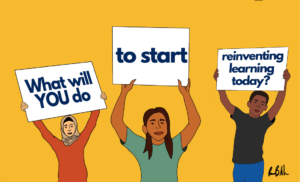Good Work: Edupreneurs Making a Difference

Kim was also one of the first impact investor–investing in for-profit companies seeking a social benefit as well as return. The dramatic increase in the number and quality of education start ups has made it easier to set a high bar for impact as well as return. Philanthropist Mitch Kapor (who brought you Lotus 123 and Lotus Notes) sponsored lots of great programs with grants but is now making an even bigger impact as an angel investor (including co-investing in several companies with Learn Capital where I am a partner).
Wendy and Kim created new pathways to teaching and to building school networks. But what’s new and exciting is that a growing percentage of students graduating from elite institution want to start companies and they want to do it in education.
Opportunity mitigation in banking is clearly part of the equation, but never been easier to build a business and make a difference in education. New application development platforms, the mobile inflection, and viral adoption (an alternative to the district sales slog) have made it possible for a team to gain traction with a $500,000 investment instead of $5 million.
Emblematic of this new era, before graduating from Stanford Business School, Clay Whitehead and Jack Lynch surveyed the landscape of possibilities and picked special education as a category ripe for innovation. After graduating they launched an online speech therapy provider, Presence Learning. They were able to quickly and relatively inexpensively demonstrate a better, faster, and cheaper approach. That’s the new opportunity to make a difference–innovation that delivers great value powered by a scalable organization.
Education is experiencing a phase change from batch-print to personal digital and that creates new opportunities for good work. It’s a great time to be an edupreneur.
Good Work is a Sunday series about finding and doing mission-driven work. We’d love to hear your story.







0 Comments
Leave a Comment
Your email address will not be published. All fields are required.